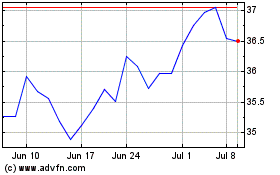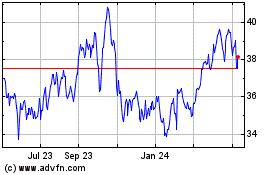Shell Profit Battered by Weak Oil Prices -- Update
February 04 2016 - 4:34AM
Dow Jones News
By Sarah Kent
LONDON-- Royal Dutch Shell PLC on Thursday announced a near 60%
slump in fourth-quarter profit, hit by sliding production and
plunging global oil prices.
The Anglo-Dutch oil company's fourth-quarter profit on a current
cost-of-supplies basis--a number similar to the net income that
U.S. oil companies report--tumbled to $1.8 billion down from $4.2
billion a year earlier. Its profit for the year slumped 80% to $3.8
billion from $19 billion in 2014.
Despite the loss, investors reacted positively to the news.
Shell's shares rose 4% in early London trading.
The sharp profit decline caps a week of dismal financial
performances from the world's largest oil companies, as a 20-month
slide in the price of oil forced write-downs and eroded earnings
for 2015. Shell rival BP PLC reported a loss of $5.2 billion in
2015, on a par with the hit it took after its Gulf of Mexico
blowout in 2010. Chevron Corp. and Exxon Mobil Corp. posted their
weakest annual results in more than a decade.
Oil prices have fallen by around 70% since June 2014, hammering
big oil companies' ability to generate profit from their oil and
gas production. Though the likes of Shell and Exxon have sizable
refining arms that tend to profit when oil prices fall, that hasn't
been enough to offset the impact of the price slump.
Shell's exploration and production business lost $5.7 billion
last year, hit by write-offs, falling prices and lower volumes. The
company said its oil business brought in 48% less last year than in
2014 and revenue generated from natural gas fell 27%. Volumes
tumbled 4% in the year, dented by a mixture of divestments,
expiring licenses, security issues in Nigeria and limitations on
output from a giant gas field in the Netherlands. Proved
reserves--an indication of an oil company's ability to replace the
oil it pumps every year--are expected to fall by 20% in 2015.
The results mark the company's last set of earnings before it
closes its roughly $50 billion acquisition of BG Group PLC on Feb.
15. Shell has come under criticism from investors and analysts for
the price it is paying for its smaller rival, but the deal will
provide a welcome boost to volumes. Shell has said it expects its
BG takeover to increase production by 20% and bolster reserves by
25% compared with the end of 2014.
The company has positioned the acquisition as a means to refocus
its strategy as one of the world's largest liquefied natural gas
producers and a major player in deepwater oil projects. The
completion of the deal will mark "the start of a new chapter in
Shell, rejuvenating the company, and improving shareholder
returns," said Chief Executive Ben van Beurden.
Shell has already taken steps to cut costs and reduce spending
to help mitigate the impact of slumping prices. The company said
its operating costs fell $4.1 billion last year and are expected to
fall another $3 billion in 2016. It plans to cut 10,000 jobs over
the course of 2015 and 2016 and sell $30 billion in assets in the
wake of its BG acquisition. Its dividends, though, remain protected
and the company has promised to distribute payouts of at least
$1.88 a share to investors this year.
"Shell will take further impactful decisions to manage through
the oil price downturn, should conditions warrant that," Mr. van
Beurden said.
Write to Sarah Kent at sarah.kent@wsj.com
(END) Dow Jones Newswires
February 04, 2016 04:19 ET (09:19 GMT)
Copyright (c) 2016 Dow Jones & Company, Inc.
BP (NYSE:BP)
Historical Stock Chart
From Mar 2024 to Apr 2024

BP (NYSE:BP)
Historical Stock Chart
From Apr 2023 to Apr 2024
